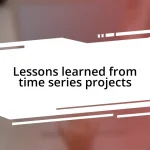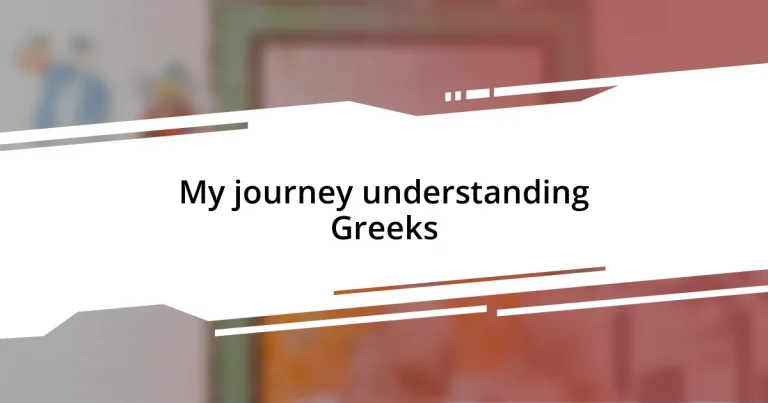Key takeaways:
- Greek culture emphasizes family values, community connection, and the warmth of traditional gatherings.
- Engaging with the Greek language enhances understanding and fosters deeper connections with locals.
- Cuisine plays a pivotal role in Greek life, with meals serving as a medium for storytelling and bonding.
- Experiencing spontaneity and shared moments strengthens community ties, highlighting the importance of being present.

Introduction to Greek Culture
Greek culture is a fascinating tapestry woven from history, tradition, and vibrant expression. I remember my first encounter with Greek art during a visit to the National Archaeological Museum in Athens; the intricate pottery and statues told stories of gods and legends that seemed to leap off the walls. Have you ever felt a deep connection to a place or its history? I certainly did that day.
Family values play a crucial role in Greek life, creating a warm sense of community that is hard to find elsewhere. Every Sunday, I found myself immersed in lively gatherings filled with laughter, delicious food, and the sweet-sounding strains of traditional music. It raised the question for me: how do these age-old customs continue to shape individual lives today?
The Greek language itself is a beautiful reflection of the culture, rich with nuances and depth. I struggled with learning a few basic phrases, but each attempt felt like a key to unlock deeper connections with the locals. Isn’t it interesting how language can transcend barriers and foster understanding? Each word I learned became a bridge that brought me closer to the heart of Greece.

Exploring Greek History
Greek history is a remarkable journey through time, filled with achievements that have shaped civilization. During my visit to the ancient ruins of Delphi, I was struck by the significance of the Oracle and its role in guiding both personal and political decisions in ancient Greece. The echoes of history there made me ponder how these ancient wisdoms still resonate in our lives today.
- The Minoan civilization (circa 3000-1450 BCE) is considered one of the earliest advanced societies in Europe, known for its impressive palaces and art.
- The rise of city-states, like Athens and Sparta, marked a pivotal point in Greek history, fostering democracy in Athens and military prowess in Sparta.
- The Persian Wars (490-479 BCE) united Greek city-states against a common enemy, showcasing their strength in collaboration.
- Philosophers such as Socrates, Plato, and Aristotle laid the groundwork for Western thought, influencing countless generations to come.
- The Hellenistic Period, following Alexander the Great’s conquests, spread Greek culture across a vast expanse, intertwining it with diverse traditions.
Reflecting on these events, I can’t help but feel a profound connection to the past. It’s incredible to realize that when I walk through the same pathways where philosophers once pondered the meaning of life, I am part of a continuum — a lineage of curiosity and discovery that transcends time.

Understanding Greek Language
The Greek language is truly a fascinating blend of history and expression that reflects the soul of its people. I remember my first conversation in Greek—it was at a quaint café in Santorini, and every syllable felt like a dance on my tongue. The beauty of its alphabet, with characters like α (alpha) and ω (omega), captivated me instantly, reminding me that learning a new language can be as much about culture as it is about communication.
As I delved into the nuances of Greek phrases, I quickly realized how the language encapsulates deep emotions and vivid imagery. For instance, the word “φιλοσοφία” (philosophia) means not just philosophy but also a love for wisdom. This made me reflect on every conversation I had, where sharing knowledge felt like a sacred exchange. The idiomatic expressions often left me chuckling—did you know that they have a phrase for “to have the wind in one’s sails”? It’s such a poetic way to convey optimism!
Learning Greek was not just about vocabulary; it was also about understanding the warmth and hospitality of the people. Each word learned painted a clearer picture of their lives, and I found myself sharing laughter and stories over traditional meals with locals, feeling increasingly embraced by their culture. Isn’t it amazing how language can transform a foreign land into a second home?
| Greek Word | Meaning |
|---|---|
| Καλημέρα (Kalimera) | Good morning |
| Φιλία (Filia) | Friendship |
| Ελευθερία (Eleftheria) | Freedom |

Discovering Greek Traditions
Greek traditions are woven into the fabric of everyday life, making every experience rich with cultural significance. I remember attending a family wedding in a small village in Greece, where the celebratory energy was infectious. The traditional dance, the “Kalamatianos,” had everyone moving in unison, demonstrating not just joy but a deep sense of community. It made me think—how many moments in our lives allow us to connect so profoundly with others?
Food is another cornerstone of Greek tradition that deeply resonated with me during my travels. At a tavern in Crete, surrounded by laughter and the aromas of grilled lamb and fresh bread, I felt a wave of warmth that transcended the meal itself. Sharing a “mezze” platter with friends turned into a ritual of storytelling and bond-building. I often wonder, isn’t it fascinating how a simple meal can transform into a tapestry of shared experiences?
Finally, the influence of religion in Greek life cannot be overlooked. During my visit to a local church during a feast day, I was struck by the elaborate candles, the vibrant icons, and the devotion of the community. It occurred to me that traditions like these carry generations of history, shaping identities and values. Isn’t it incredible how spirituality can create a common thread through centuries?

Experiencing Greek Cuisine
Experiencing Greek cuisine is like embarking on a sensory journey—every bite, a story waiting to be told. I vividly recall my first taste of moussaka; its layers of eggplant, spiced ground meat, and creamy béchamel felt like a warm hug on a plate. As I savored it, I realized how closely food connects us to culture; in that moment, I could hear the whispers of generations of Greek mothers crafting this timeless dish.
At an outdoor taverna in Athens, I had the joy of participating in a traditional “kleftiko” feast, where lamb cooked underground rendered the meat exceptionally tender and flavorful. Sharing this meal with new friends, we raised glasses of ouzo while laughing and recounting our traveling tales. This kind of culinary experience isn’t just about flavors; it’s about creating bonds over shared dishes, transforming strangers into companions with every hearty laugh and clink of glasses.
What struck me most was the significance of “filoxenia,” or hospitality, deeply embedded in every dining experience. I remember how my host insisted I try every dish, placing a heaping serving of tzatziki and pita in front of me as if it were a celebration of our newfound friendship. Isn’t it remarkable how food can foster such warmth and connection? Each meal became a delightful reminder of how flavors have the power to create lasting memories and forge friendships across cultural divides.

Engaging with Greek People
Engaging with Greek people often feels like stepping into a warm embrace. I remember wandering through the narrow streets of Santorini when a local shopkeeper invited me in for a chat, despite my broken Greek. As we laughed over my attempts at the language, it struck me how open and welcoming the Greek spirit is, reminding me that genuine connection often transcends words.
During a lively market trip in Athens, I encountered a group of vendors passionately discussing their produce. It was infectious! Their excitement made me feel part of something bigger, where each tomato and olive held a story. Isn’t it amazing how a shared enthusiasm for fresh ingredients can create an instant bond among strangers?
One of my most cherished interactions was during a traditional Greek coffee ceremony at a family home. As I savored that bitter-sweet brew, the host shared stories of her family’s history, painting vivid pictures of life in Greece over generations. It made me wonder, how many stories are waiting to be uncovered behind each cup or meal, waiting for someone to take the time to listen? It’s these moments that deeply connect us and reveal the heart of Greek culture.

Reflecting on My Learnings
Reflecting on my learnings, I can’t help but smile when I think about how much I’ve grown through my interactions with the Greeks. One afternoon in a quaint taverna, I joined an elderly gentleman in a passionate debate over soccer. His animated gestures and fervent expressions taught me that conversations can be equally rich in emotion as they are in content. Have you ever stepped into a discussion so vibrant it felt like you were part of a performance?
What really hit home, though, was the sense of community that permeated everything—a feeling that we were all in this together. During a traditional village festival, I was swept into a dance circle, arms around strangers who in minutes became friends. I had never felt so liberated, so joyous; it was then that I realized connection comes alive through shared experiences. Isn’t it fascinating how a sense of unity can blossom from spontaneity?
The biggest lesson I took away was the importance of being present and open. Whether I was sharing a meal or engaging in conversation, there was an unspoken expectation to invest in those moments fully. I think of the laughter and stories exchanged at every table; it left me pondering—how often do we miss the beauty of these simple interactions in our daily lives? The more I reflect, the more I appreciate how these experiences intertwined with curiosity can profoundly reshape our understanding of cultures and ourselves.














